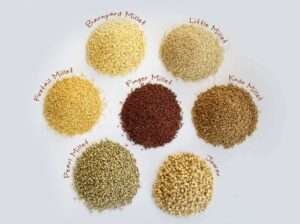Millet Marvels: Why Pregnant Women Should Add Them to Their Diet

What are Millets?
Millet is a group of small-seeded grasses that are widely grown around the world as food crops. They are used as a staple food in many parts of Africa and Asia, and are also gaining popularity in other parts of the world due to their nutritional benefits. There are several different types of millets, including pearl millet, foxtail millet, finger millet (also known as ragi), and proso millet, among others. Millets are typically gluten-free, high in fiber, and a good source of protein, vitamins, and minerals such as iron, calcium, and magnesium. They can be consumed in a variety of forms, including whole grain, flour, flakes, and puffed grains, and can be used in a wide range of dishes, from porridge to bread to desserts.
Health benefits during Pregnancy
- High in fiber: Millets are high in fiber, which can help to regulate digestion and prevent constipation, a common problem during pregnancy.
- Good source of protein: Millets are a good source of plant-based protein, which is important for building and repairing tissues in both the mother and the developing baby.
- Rich in vitamins and minerals: Millets are rich in vitamins and minerals such as iron, calcium, magnesium, and folate, which are essential for the healthy development of the baby.
- Gluten-free: Many millets are naturally gluten-free, making them a great option for pregnant women who may have celiac disease or gluten intolerance.
- Low glycemic index: Some types of millets have a low glycemic index, which can help to regulate blood sugar levels and reduce the risk of gestational diabetes.
Benefits of different types of millets for pregnant women
- Foxtail Millet: Foxtail millet is a good source of iron, which is essential for the formation of red blood cells and for the delivery of oxygen to the developing baby. It is also a good source of calcium, which is important for the development of the baby’s bones and teeth.
- Finger Millet (Ragi): Finger millet is high in calcium, which is important for the development of the baby’s bones and teeth. It is also rich in iron, which helps to prevent anemia, a common problem during pregnancy.
- Pearl Millet (Bajra): Pearl millet is rich in folate, which is important for the healthy development of the baby’s brain and nervous system. It is also a good source of iron and calcium.
- Barnyard Millet: Barnyard millet is rich in fiber, protein, and iron. It also has a low glycemic index, which can help to regulate blood sugar levels and reduce the risk of gestational diabetes.
- Sorghum: Sorghum is a good source of protein, iron, and B vitamins. It is also high in antioxidants, which can help to protect the mother and the developing baby from oxidative stress.










